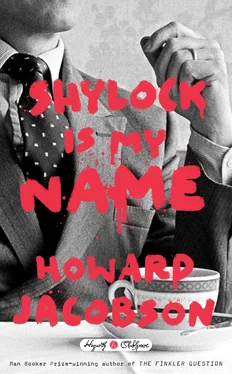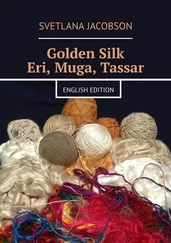Strulovitch, who is holding a sheet of headed paper which D’Anton at once recognises as his, is the first to speak.
“We can do it here or inside,” he says.
“ It ?”
“Well if I tell you that, we are already doing it. You’d prefer it here then?”
“I am not frightened of you,” D’Anton says.
Strulovitch smoothes the soft tips of his shirt collar. “I wouldn’t expect you to be. We are both priestly men.”
“A more priestly man would have made contact with me some other way before coming hammering at my door.”
Strulovitch laughs. “Hammering? Is a bell pull not for pulling? I could not have announced myself more peaceably. I twitched the rope as though plucking a loose thread from a tapestry.”
“And so vandalising it…I see you have read my letter.”
“What else would bring me here? You were hoping for a response. Well here I am.”
“But you aren’t carrying the picture.”
“And you aren’t handing me what I want in return for it.”
“I can write you a cheque for it now.”
“I don’t want a cheque.”
“So what do you want?”
“Not what, whom.”
“I don’t have your daughter, if she’s what this is all about.”
“You admit you know about my daughter. That saves us both time.”
“I have met your daughter, yes. An unhappy girl.”
“Is that for you to judge?”
“When she speaks to me of her unhappiness, I think it is.”
“Why would she speak to you of her unhappiness? Who are you to her?”
“A friend of a friend. But you know that. You have seen us together.”
“I saw you together on the night Beatrice ran away. Odd he should have been with you and not her that night. What is he to you, anyway?”
Strulovitch is pleased with himself for not answering his own question with the words “Rough trade?”
But D’Anton guesses what he’s not saying. “I am not obliged to discuss the nature of my friendships with you,” he says.
“And I am not obliged to let you have the picture you have asked for.”
The last thing D’Anton wants is to have Strulovitch in his house, assessing him, looking over his treasures, picturing how he lives, but in his mind’s eye he sees the unhappy Barnaby, already showing signs of petulant jealousy that D’Anton has spirited Gratan away to Venice with his floozie but has so far done nothing for him, not even in the matter of the lost ring that Plury is sure to be enquiring about any day now. In a tableau of the heart, D’Anton paints himself creeping up on Barnaby, lightly clapping his hands over his eyes, and leading him to a wall on which Love’s First Lesson is hanging. For you. For you to give to Plury, because I want you to be happy together. But of course the subtext of this gift is that it is from me to you.
D’Anton loves being in receipt of gratitude, whatever its source. But gratitude from Barnaby is special.
“Come in then if you must,” he tells Strulovitch.
There is no hall. They are already in a morning room every wall of which is hung from eye level to ceiling with miniature portraits. Watercolours on ivory, vellum and porcelain, oils on enamel or copper, snuffbox covers in filigree gold frames. I don’t see any Kitaj or Kossoff, Strulovitch thinks, though his glance is of the briefest.
D’Anton doesn’t offer Strulovitch a seat. “I am not able,” he says, “to do business with you on the basis you suggest. I am not in a position to barter your daughter.”
“Are you saying she is not here?”
“I wasn’t saying that. But no she isn’t. She never was here. I don’t think she’d like it.”
Strulovitch knows that D’Anton means to impugn his daughter’s taste, but looking quickly around he knows he’s right. “No,” he says. “She wouldn’t like it at all. But if she isn’t here, where is she?”
“If I did know where she was why would I tell you?”
Strulovitch taps the letter which he still carries like a summons.
“You think I want the picture that badly?”
“Well someone does. Unless you were merely making merry with me.”
“Yes, you are right — someone does.”
“Gratan Howsome presumably. As a love token for my daughter. You can hardly expect me to hand it over lightly in those circumstances.”
“If I tell you you are wrong, that it is for someone else entirely, will you name your price?”
Is this the moment, D’Anton wonders, to bring up my willingness to rethink my position on his gallery? He thinks it probably isn’t.
“My price is still my daughter.”
“Then it is too high. I cannot betray one friend to please another.”
“You should not look on it as betraying a friend. You’d be assisting a father.”
“A father can be as much a rogue as any man. Your daughter was made unhappy until she met Gratan. It would be wrong of me to intervene in this, even supposing I had the influence effectively to do so. And I would hardly be likely to encourage him to return to face your savage proposal.”
“To ‘return,’ you say. So they have gone away.”
“Your daughter is of an age morally to make her own decisions.”
“Now she is,” Strulovitch says.
“Meaning what?”
“Meaning that she wasn’t when your friend began with her.”
“I don’t know what ‘began with her’ is supposed to mean.”
“Then let me enlighten you. I have evidence that Gratan Howsome was sleeping with my daughter when she was fifteen. That this is a criminal offence I don’t have to tell you. That others who knowingly connived in the offence could be prosecuted as accessories is something you might not have thought about, but I suggest you think about it now. One way or another, I want my daughter returned and your friend with her. How I proceed from there depends largely on your co-operation.”
It is a matter of immense satisfaction to Strulovitch that D’Anton has to find himself a chair, though none looks suitable for sitting in.
—
“My guess,” Plurabelle opined, “is that he’s bluffing.”
“It shouldn’t be difficult to find out how old Beatrice was when Gratan…” D’Anton declined to finish. Some things, even when they concerned people he cared about, he preferred not to put his mind to.
“I don’t mean bluffing about her age,” Plury said impatiently. “I mean bluffing about what he’s going to do.”
“To Gratan?”
“To all of us.”
“We can’t be held responsible for what went on between them. How were we to know how old Beatrice was and what Gratan was getting up to with her?”
“I knew.”
“You knew her age?”
“I never questioned her about her age. And probably wouldn’t have done anything had I known. I had my first affair with a married man when I was twelve.”
“Well then…”
“But I knew they were sleeping together. I gave them a room.”
“That’s not a crime.”
“It is if I knew.”
“You just said you didn’t know.”
“But what if I have to prove that? I don’t want the police here, D’Anton. For any number of reasons. And neither, I would imagine, do you.”
“Plury, I have nothing to hide.”
“It was you, D’Anton, who brought her here. A Jewess to feed Gratan’s appetite for Jewesses. You found the idea amusing. As did I.”
“Amusing, but no more than that. I didn’t imagine there was going to be a grand affair…”
“Just a squalid one — is that your point? I don’t think that will help you. Especially when it’s discovered that you found the girl at the academy where you lecture.”
D’Anton winced at the word “lecture.” “I have broken no academy rules. I didn’t find her for my pleasure. I didn’t ‘find’ her full stop. She was there. Hardly inconspicuous is she?”
Читать дальше












